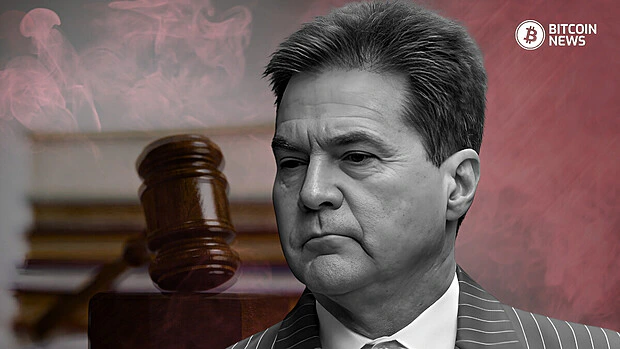Craig Steven Wright (CSW) is facing severe legal consequences after claiming for years that he is Satoshi Nakamoto, the pseudonymous creator of Bitcoin.
The ongoing court battle between Craig Wright and the Crypto Open Patent Alliance (COPA) has garnered significant attention, as COPA seeks to hold Wright accountable for false claims and fraudulent actions.
The case has seen dramatic developments, with potential penalties including substantial financial costs and even prison time for Wright.
The legal drama began when COPA took Wright to court in February, aiming to resolve the long-standing debate over whether Wright is indeed Satoshi Nakamoto.
The court ruled in COPA’s favor in March, determining that Wright was not the creator of Bitcoin and had not authored the Bitcoin whitepaper. This ruling was a significant blow to Wright, who has long asserted his identity as Nakamoto.
In the latest proceedings, COPA has asked the court to impose substantial penalties on Wright. They demand that he pay 85% of their legal costs, which have been substantial due to the protracted nature of the litigation.
Jonathan Hough, one of COPA’s legal representatives, argued that Wright should also face a civil restraint order to prevent him from pursuing further legal cases based on his claims of being Nakamoto.
Hough stated, “There is a powerful public interest in [Wright’s claims] being brought to an end now.”
The court hearings have revealed the personal toll Wright’s actions have taken on individuals within the Bitcoin community.
Peter McCormack, a prominent figure in the industry, suffered stress-induced cardiac issues and hospitalizations due to the pressure of defending himself against Wright’s claims.
Another individual, known as Hodlonaut, faced surveillance, threats, and had to leave his teaching job, impacting his young daughter. Hough emphasized the severe impact on these individuals, stating:
“Their lives were upended by CSW and Ayre’s actions.”
COPA’s demands go beyond financial compensation. They are pushing for an injunction to prevent Wright from publicly claiming to be Satoshi Nakamoto.
This includes removing past statements from the internet, a task that Wright’s defense team argues is overly burdensome.
Additionally, COPA wants Wright to post the court’s findings on platforms like Twitter, Slack, and his website, and in The Times newspaper, ensuring these posts remain for six months.
Hough also suggested that Wright and his associates, including Stefen Matthews, should face criminal prosecution for perjury and document forgery. He presented video evidence of Wright discussing the penalties for perjury, underscoring the gravity of the accusations.
In the video evidence presented to court, Wright can be heard saying:
“Yes, there is altered pages […] So, I’m going to court on this; You know what happens when you lie in the court […] you get 20 years. That’s how real things work in the real world […] In the real world, people have evidence and rules.”
Wright’s defense team has pushed back against COPA’s demands, arguing that they infringe on Wright’s human rights, particularly his right to free speech under Article 10 of the Human Rights Act.
Craig Orr, Wright’s lawyer, stated that Wright believes he is Satoshi Nakamoto and argues that under Article 10, he has the right to assert this claim. The defense also argued that the court’s findings have already been widely publicized, making additional public declarations unnecessary.
Orr criticized COPA’s motives, asserting:
“COPA seeks wide-ranging orders to stop CSW re-litigating. COPA is motivated by a desire for revenge and a desire to punish and humiliate CSW. That is not legitimate.”
He further contended that COPA had not suffered any direct harm, stating, “COPA is not Satoshi, COPA did not assert IP rights. None of COPA’s IP rights have been violated. COPA has not been defamed, the same applies to the developers.”
He outlined the remedy sought by COPA as “very wide-ranging, novel, and unprecedented.”
Notably, the court is considering severe penalties for Wright, including a custodial sentence.
According to the Perjury Act 1911, the maximum sentence for perjury in the UK is seven years, along with a fine. The judge, James Mellor, has expressed a willingness to impose an “extraordinary” sentence due to Wright’s extensive campaign to mislead the public about his identity.
Mellor indicated that Wright’s actions had a significant chilling effect on Bitcoin development, with five developers distancing themselves from projects due to Wright’s aggressive legal strategies.
Hough argued that Wright’s actions warranted a stringent judicial response to protect the integrity of the Bitcoin ecosystem and prevent Wright from perpetuating his claims.
As the proceedings continue, the court has yet to make a final decision on the penalties and injunctive relief.
Judge Mellor stated that he would first decide on the costs before addressing the specific measures to prevent Wright from making further claims about being Satoshi Nakamoto.
Wright’s legal troubles are far from over, with potential criminal proceedings looming on the horizon. COPA’s push to escalate the case within the UK judiciary and include Wright’s associates as criminal defendants highlights the seriousness of the situation.
The court’s final decision could have lasting implications for Wright and the broader digital asset community.










